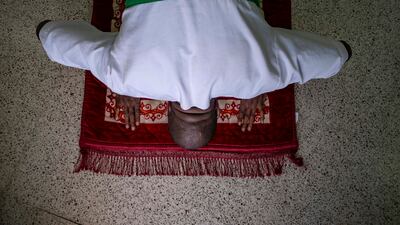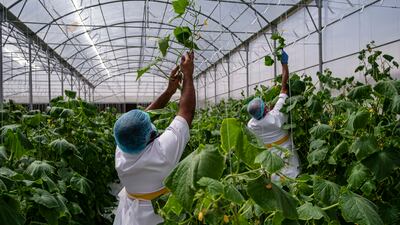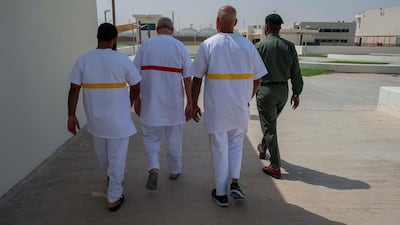In the heart of a Dubai prison, Ramadan is a particularly poignant time of reflection and spiritual renewal.
On a visit to the Dubai Police Correctional Establishment in Al Awir, The National spoke to a number of inmates and saw first-hand how they honour the holy month.
From breaking fast over iftar to waking up for suhoor, the key principles are adhered to – and some previously non-Muslims have even converted to Islam during their time behind bars.
A 44-year-old former Christian from Burundi, who now calls himself Rashid, converted to Islam three months ago and is navigating his first Ramadan.
In August 2021, he was taken into custody after he was found in possession of drugs at Dubai International Airport.
This led to a decade-long sentence and a Dh50,000 ($13,615) fine on drug-trafficking charges but also, ultimately, to a rediscovery of faith in the most unlikely of places.
“The idea of spending the rest of my life behind bars was the darkest moment of my life but it was that dark moment that led me to find light,” he told The National.
The shift was not the outcome of a singular event but a series of encounters and gestures of kindness from Muslim prisoners and officers.
“Starting from the police officers who arrested me to the Muslim inmates around me, they have all shown respect, help and kindness I have not seen before,” he said.
“My knowledge of Islam was limited, despite my maternal uncle embracing the faith years ago.
“But the way Dubai Police officers and fellow inmates treated me, attributing that kindness to their faith made me rethink my own.”
Carrying a storm of thoughts, Rashid said he drifted into sleep one night three months ago and saw himself back in his village in a dream.
“I was greeted by so many people including my mother and everyone was dressed in white,” he said.
“I woke up with one clear thought in my head: I want to embrace Islam. Until that moment, the thought of converting had never crossed my mind."
After sharing his decision with officers, he received support and guidance, including an English copy of the Quran and Arabic lessons from a Sudanese prisoner.
“I have learnt half of the Arabic alphabet and am now practising writing,” Rashid added.
His wife and teenage daughter, while not Muslims, showed openness to his new faith but fasting during Ramadan was something he initially viewed with apprehension.
This was until the concept was better explained to him by inmates and officers, while reading about the holy month helped him understand its significance.
“My first reaction was like: 'I am deprived of freedom and now will be deprived of food,'" he said.
“Now I believe Ramadan is not about stopping food. It's about stopping yourself from losing control. It's to tell you that you can but you think you can’t.”
Another story of faith and transformation is that of a 27-year-old Emirati inmate serving a 15-year sentence.
He finds solace in his prayers and Quran memorising sessions, while achieving purpose through participation in a prison farm project – launched a few months ago as part of a rehabilitation drive by Dubai Police.
“I wake up for suhoor at 3am then sleep for a short while until it's time for Al Fajr prayer,” he said.
He spends his time at the farm caring for his crops until it's Dhuhr (midday) prayer time.
“I’m growing tomatoes and cucumbers,” he said.
Meanwhile, an Indian inmate and farmworker, 48, finds spiritual sustenance in the routine of suhoor, prayer and reading the Quran.
“There is so much peace and fulfilment derived from these practices,” he said.
The acts of generosity observed during Ramadan, he says, represent another aspect that offers spiritual nourishment.
“One example is an inmate who provides ordered-in iftar meals for all 60 inmates in our ward," he said.
“This reflects the spirit of giving and solidarity that defines Ramadan for me.”





